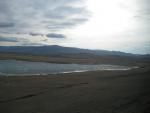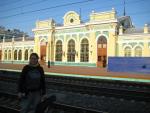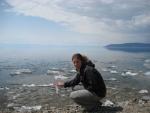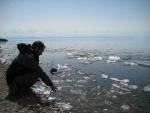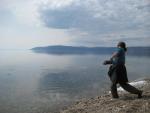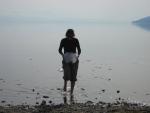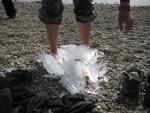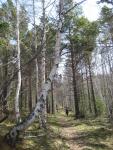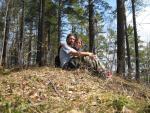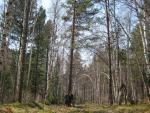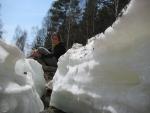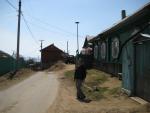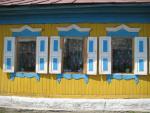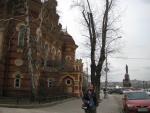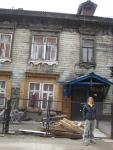Chilling out in Siberia
Tue 18th May 2010 — drew
We had a fairly hurried dinner before getting on the train again in UB. As this was our last meal in Mongolia we went to a local restaurant that had been recommended to us. Although there was an English menu, the description of the dishes still left us a little uncertain of what we were ordering; we went for 'main meal with potatoes' which turned out to be a shepherd's pie made with mutton and was pretty good.
There were not many foreigners on our train departing that evening - perhaps only 8 of 'us' who shared two compartments in carriage #1. We were paired with an Australian girl and a young Australian bloke who had arrived in UB on a motorbike. He had ridden all the way from the Vietnam/China border and had quite a few stories to tell about this adventure - especially the small towns where they'd never seen a foreigner before and the crossing of the Gobi desert which had involved trying to follow the train tracks in the absence of any road.
We expected to reach the Mongolia/Russia border at around 5.30am so everyone was happy to get an early night. We were relieved to be allowed to sleep until after 7am but it was slightly disconcerting when we stepped onto the platform at the Mongolian border to find our carriage was now alone - no engine and no other carriages were attached to us!
Despite the fact that the rail gauge is the same on both sides of the border, so the bogies didn't need to be changed, the crossing is notorious for taking a long time. The passport procedures and customs checks were relatively quick and painless on both sides of the border but we sat on each side for around 5 hours none-the-less often with our carriage stranded all by itself again. It was not until early evening that we were on our way again inside Russia.
We stopped a couple of hours later at a decent sized station and, after the frustrations of the day, our fellow travellers and we were pleased to buy some Russian beer (which is available in 1 litre cans) and celebrate our last border crossing before Moscow. Just as we were all thinking of getting to sleep, a couple of very large Russian soldiers appeared in our cabin and seemed to want to join the party. It was difficult to communicate to them that we were all just finishing our drinks before going to sleep; but thankfully our ample provodnista (carriage attendant) had decided it was time for all to go to bed and chased the soldiers away.
Early the next morning, we were pleased to arrive in Irkutsk - our stop off in Russian Siberia. The display in the station announced a temperature of 3deg C which must be the coldest we have been since our trek in Nepal. Again we opted to head straight out of town - this time to Listvyanka, about 70km away, a village on the shore of Lake Baikal (which is the deepest fresh water lake in the world). The lake was formed by rifting tectonic plates and is getting deeper as the plates separate. At the last measurement, it was 1637m deep and it contains nearly 1/5th of all the world's fresh, unfrozen water. Its unique habitat is home to some strange oily fish and seals specially adapted to survival at great depths. Apparently, the lake will eventually form the 5th Ocean splitting Asia as the plates continue to pull apart... but suffice to say for now that it is a big lake.
The Trans-Siberian travellers we had met in Mongolia heading the other way had told us that the lake had been frozen over but was rapidly thawing. This process is usually very fast once it begins (marked by thunderous cracks) and we were only just there in time to see the last of the ice persisting. We were lucky to arrive on a beautiful sunny Sunday and the locals were out at the lake in force enjoying the weather and the last of the ice. All along the rocky lakeside beaches, people were having barbecues, drinking beer and having a jolly time. It was good fun sitting and joining them for a while with a couple of new acquaintances we had met along the way.
The folk that we had shared a ger with in Mongolia had recommended Russian bubbly to us - saying that it was cheap and tasty. We managed to track some down in Listvyanka and spotted some enterprising locals who were keeping their beers cool on ice pulled straight out of the lake. We followed their lead and Heather was more than happy to volunteer to go and collect a large hunk of ice floating near the shore. The remaining ice may serve as an indicator as to how cold the water was, certainly Heather's short paddle had been enough to turn her toes blue, but there was still one brave (or stupid) soul who went for a quick swim! We were happy to sit in the sun and watch while the ice chilled our champagne nicely.
Most of the buildings in Listvyanka are built using wood in the traditional fashion with decorative windows. Our guest house was set back up one of the valleys and was a handsome chalet with good views down to the lake from our balcony. Our hostess - Tatiana - was a very traditional Russian lady and was very pleasant but gave us the impression that she would take no nonsense. Our dinner of meatballs with potatoes and beetroot was delicious and a welcome return to root vegetables.
Having spent a long time gazing out at the lake on the previous day, we decided to take a walk up into the forested hills on the Monday. The path was unclear and there were several boggy sections where the snow had recently melted which lead to some soggy shoes but we soon climbed up out of the valley through beautiful silver birch and fir trees to a ridge overlooking the lake. Despite the view being slightly blocked by the forest below, it was still good to get a better idea of the vast scale of the lake from this vantage point.
On our return to the lakeside, we realised how small Listvyanka is as we bumped into all our fellow travellers in one of the cafes overlooking the lake. This lead on to a very pleasant evening drinking more Russian sparkling wine and enjoying some smoked Omul fish and baked potatoes - a dish that the area is famous for. Despite being at the limits of our fish tolerance, it was very tasty. We were treated to a beautiful sunset which was perfectly reflected in the calm waters of the lake.
After two nights relaxing on the shores of Lake Baikal, we returned for a day in Irkutsk a city of some 600,000 people. We were staying in a traditional wooden house which was home to three female generations of the same family. It was rather strange to be sleeping on a fold-out sofa in their lounge but they, and their pet dog Mischa, were very friendly.
We enjoyed wandering around historical Irkutsk (which is known as the Paris of Siberia) although there was an icy wind and it was very chilly. There was an interesting mix of modernity and traditional wooden dwellings (primarily made out of larch wood) with a few religious buildings boasting golden spires and domes mixed in with some austere structures from the Soviet era.
Our enjoyment of a return to a more familiar diet was continued with a delicious dinner of potatoes, beans and roast chicken with bread and cheese all washed down with a very good draught beer. This was in a cellar bar and when we headed outside afterwards, at around 9pm, we were surprised to find it was still very light. It's very different to South East Asia where we had become accustomed to a quick sunset before 7pm, and a reminder of how much further north we now were.
- ‹ previous
- 69 of 70
- next ›


